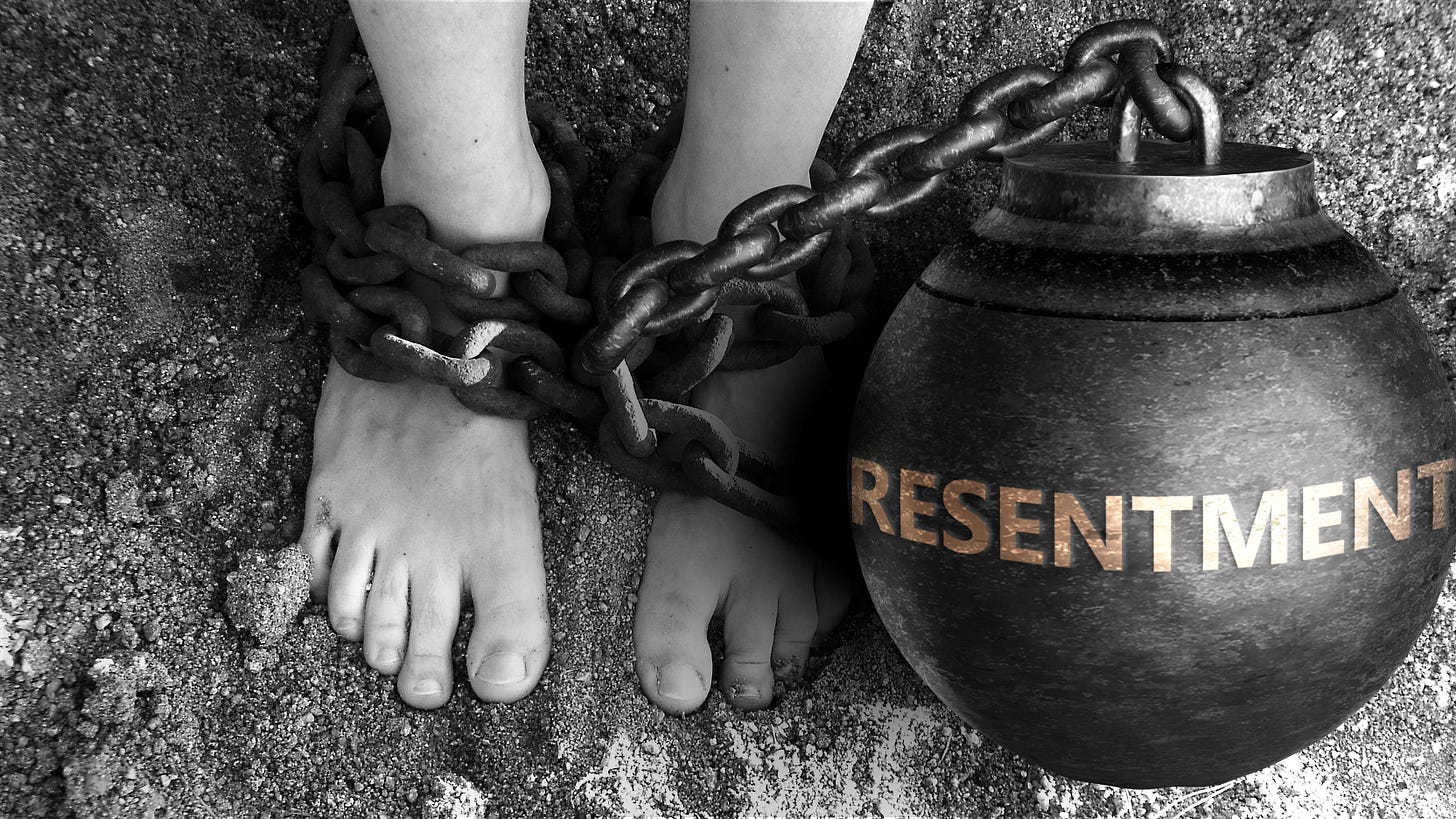Revenge. What can I say? I am sure most of us have more than one example in our lives. Personally, I have plenty, especially in the past three years.
One of the most destructive and self-defeating emotions that humans can experience. At its core, it usually stems from feelings of hurt, anger, and resentment.
All of us have experienced feelings of revenge, and we may or may not have acted on them to seek satisfaction. And let me make myself clear: I am not advocating for passivity when action is required. Taking appropriate and constructive action is essential in addressing issues effectively and ensuring meaningful change. However, there is a difference between taking revenge and taking action to correct destructive behaviour, wrongdoing, or ignorance. The latter is necessary and constructive, while the former harms the individual and fails to solve the issue. Acting out of revenge perpetuates a pendulum effect, swinging society from one extreme to another instead of fostering meaningful, lasting change.
So, let’s dive into revenge! Contrary to popular narratives that unfortunately include many progressive psychotherapists – that sometimes glorify vengeance as an act of empowerment, revenge is more than often the hallmark of weak individuals with low self-esteem. Think about it. It is a reflection of an inability to take responsibility for one’s own actions and choices, instead blaming others and external circumstances for personal failures or perceived injustices. And isn’t this toxic cycle exacerbated in today’s social climate? Of course I am talking about the so-called "woke virus" that fuels division and resentment under the guise of social justice.
Revenge is an easy trap to fall into, especially if you victimize yourself. Understanding the psychology behind it, its underlying motivations, and the characteristics of anyone consumed by it provides valuable insights into why it persists and how it can be eradicated through personal responsibility and accountability.
The Psychology of Revenge: Weakness Masquerading as Strength
Revenge is often rooted in feelings of inadequacy and a lack of self-worth. When someone feels wronged, their ego takes a hit.
However, instead of confronting their emotions and seeking constructive solutions, weak individuals resort to revenge as a way of restoring their bruised ego.
We do know that this illusion of power is fleeting and ultimately hollow. Clearly the act of revenge does not address the root cause of the hurt but merely perpetuates a cycle of negativity.
Low self-esteem, a plague of today, is a significant factor in the psychology of revenge. Individuals with a fragile sense of self often feel powerless in the face of adversity or conflict. Instead of looking inward and taking ownership of their role in a situation, they project their insecurities onto others.
Revenge becomes a coping mechanism to shift the focus away from their own shortcomings.
For these individuals, the idea of "getting even" offers a false sense of justice and control, masking their deep-seated feelings of inadequacy.
Revenge and the "Woke Virus"

In today’s cultural climate, the "woke virus" has amplified the prevalence of revenge and resentment.
While the original intent of "wokeness" may have been to address systemic injustices, it has morphed into a platform for grievance-based ideologies that prioritize victimhood over empowerment.
In this context, revenge today manifests as a collective phenomenon, where individuals and groups seek retribution for historical or perceived wrongs. Rather than fostering unity and understanding, this mindset deepens divides and perpetuates cycles of hostility. The question is, how is it possible that such a simple concept is not understood?
The "woke virus" thrives on the narrative of blame. It encourages individuals to externalize their problems and attribute their struggles to systemic factors or other people. This mentality breeds resentment and justifies revenge as a form of "justice." However, this approach overlooks the importance of personal responsibility and self-improvement.
By focusing solely on external factors, we fail to recognize their agency in shaping their own lives and circumstances.
Moreover, the "woke" culture often weaponizes social justice to settle personal grievances. Cancel culture, is in reality a form of modern-day revenge where individuals or groups seek to ruin someone’s reputation or livelihood for a perceived offense. A practice that not only undermines the principles of forgiveness and growth but also reflects the vindictive tendencies of those who engage in it. Ultimately, it is a manifestation of weakness—a refusal to engage in meaningful dialogue or self-reflection.
Characteristics of a Personality Driven by Revenge and Resentment

Unfortunately, many psychotherapists today do not help at all. In fact, they often thrive on people with low self-esteem, trapping them in a (profitable) cycle of falsely increasing self-esteem by fostering narcissism.
This process includes feelings of superiority, exaggerating events in their lives, and shifting blame onto others.
Consumed by revenge the person refuses to take responsibility for their actions or decisions. Instead, they place the blame on others, perpetuating a victim mentality that justifies their vindictive behaviour.
Revenge-driven individuals typically struggle with feelings of inadequacy. Their need to "get even" stems from a desire to prove their worth or regain a sense of power that they feel they lack.
The inability to manage emotions such as anger and hurt is a hallmark of those who seek revenge. Instead of processing their feelings in a healthy way, they lash out in destructive ways.
Resentment is the fuel that sustains the desire for revenge. Over time, this toxic emotion corrodes the individual’s mental and emotional well-being, leading to bitterness and hostility.
Revenge-driven individuals often fail to consider the long-term consequences of their actions. They prioritize immediate gratification over lasting peace and resolution.
Taking 100% Responsibility: The Antidote to Revenge
One of the most effective ways to eliminate the desire for revenge is to embrace the concept of 100% responsibility.
This mindset shifts the focus away from external factors and places the focus on us taking ownership of our thoughts, feelings, and actions. By doing so, you can break free from the cycle of blame and resentment, paving the way for personal growth and empowerment.
Taking 100% responsibility requires a willingness to confront our own role in a situation. Slay the dragons within. So instead of asking, "Who is to blame?" you ask, "What can I do to improve this situation?" Clearly this shift in perspective will foster a sense of agency and control and reduce the need to seek revenge as a way of reclaiming power.
Furthermore, taking responsibility involves acknowledging and addressing one’s own insecurities and emotional triggers.
By developing self-awareness and emotional intelligence, you learn to manage your feelings in a constructive manner. This not only prevents the escalation of conflicts but also promotes healthier relationships and interactions. And you are now on the right path for self-development and growth.
The Power of Forgiveness
Forgiveness is a critical component of taking responsibility and overcoming the desire for revenge.
Contrary to popular belief, forgiveness is not about condoning harmful behaviour or letting others off the hook. Instead, it is about releasing the burden of anger and resentment that weighs down the individual.
By forgiving others, we free ourselves from the emotional chains of the past, allowing us to focus on building a better future. I know, it is not always easy, but it is necessary.
After all, forgiveness requires strength and courage. It involves confronting one’s own pain and choosing to let go of the desire for retribution. In doing so, individuals reclaim their power and demonstrate resilience in the face of adversity.
This act of inner strength is a stark contrast to the weakness and insecurity that drive revenge.
And always remember, whoever has done wrong will face the consequences one way or another. You do not want to be the vessel of their payment, as this will ultimately come back to you. Instead, embrace the phrase ‘Karma is a bitch’ and allow the person to face the consequences of their actions without your acts of revenge.
Building Resilience and Emotional Strength
Overcoming the desire for revenge requires us to cultivate resilience and emotional strength. There are plenty of ways to do that (modern or old), with practices such as mindfulness, self-reflection, and personal development.
After all, isn’t it more important to focus on our own growth and well-being? We can rise above the negativity and pettiness of revenge-driven behaviour.
Resilience enables us to navigate challenges and setbacks with grace and composure. Instead of succumbing to anger and resentment, we view difficulties as opportunities for learning and growth.
The Ripple Effect of Responsibility
When we take 100% responsibility for our lives, the impact extends beyond our personal well-being. This mindset has a ripple effect on our relationships, communities, and society as a whole.
By modelling accountability and forgiveness, we inspire others to do the same, creating a culture of true empathy and understanding, you know the real ones, not the narcissistic pathological ones.
Revenge perpetuates cycles of conflict and division. It reinforces the very problems it seeks to address, leaving us and our communities worse off in the long run.
PS: If you haven’t read it, I highly recommend the book by Jocko Willink, ‘Extreme Ownership’.
Conclusion

Revenge is a destructive force that reflects weakness, insecurity, and a lack of personal accountability.
It is a symptom of low self-esteem and an inability to manage one’s emotions. In today’s "woke" culture, revenge has become a collective phenomenon, fuelled by narratives of blame and victimhood. This mindset only deepens divisions and perpetuates cycles of hostility.
The antidote to revenge lies in taking 100% responsibility for one’s thoughts, feelings, and actions. By embracing this mindset, we can break free from the toxic cycle of blame and resentment, and allow for personal growth and empowerment. Forgiveness, resilience, and emotional intelligence will further strengthen this foundation, enabling us to navigate life’s challenges with grace and composure.
Ultimately, revenge is a choice—and so is responsibility.
By choosing the latter, we can transcend the limitations of anger and resentment, paving the way for a brighter and more fulfilling future for us and for all.






thank you for this insightful, emotionally intelligent article that every human being would benefit from reading right now......revenge is such a powerful energy to feel and to just allow it without lashing out in any way was for me a whole growth level of screaming my brokenness outloud and yet containing the desire to act which would only fuel righteousness and narcissism. thank you for writing an article for those of us who wish to "adult" in a child-led world.
(Tone: Honest) Reading your article felt like a breath of fresh air and once I completed it I let out a sigh of relief! You’ve beautifully & eloquently touched on & explained in bite-size & understandable detail a lot of what I’ve touched on many a time- particularly in the last few years! The disheartening truth of my experience was that instead of engaging to ask questions & exchange perspectives many were/still are quick to scoff, attempt to discredit, and just say hurtful things…However, “self-accountability” and taking ownership of my actions, emotions, thoughts, etc…is the golden key for learning & moving forward anyway!
Grateful for your article; thank you for writing and sharing! 🙏🏼💜🖤✌🏼